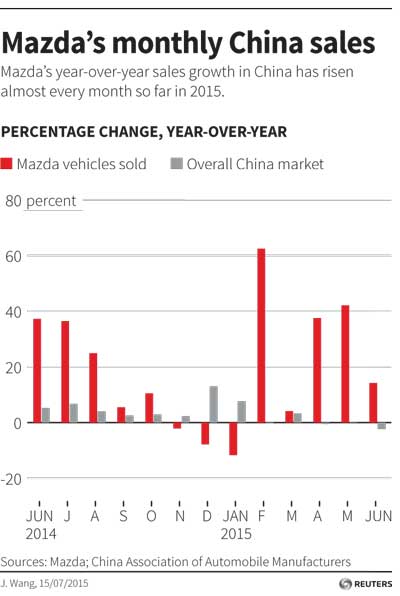Sunday Feb 22, 2026
Sunday Feb 22, 2026
Monday, 20 July 2015 00:00 - - {{hitsCtrl.values.hits}}
Mazda’s China sales grew 17% in H1 vs market’s 1.4%
Reuters: Chinese car sales have barely got out of first gear this year, yet a shift in consumer behavior has sent Mazda Motor Corp hurtling out of the pack, posting records and struggling to keep pace only with demand.
Japan’s fifth-biggest automaker has found its sporty design philosophy clicked with an emerging class of drivers who have abandoned copycat buying and the widely held perception that only long-established leaders, notably Volkswagen AG , make decent cars.
“Other cars are either too round or stocky, but the CX-5 has more of a flowing character,” said Nanjing office worker Xu Duo, 27, who bought Mazda’s sport utility vehicle last year.
China car sales grew 1.4% in the first half of 2015, the weakest in six years. An industry body last week said a stock market slump exacerbated consumer concern about prospects in an economy expanding at its slowest in over two decades.
Yet Mazda logged its best-ever first half at 17%, boosted by sales of the CX-5 as well as sedans Axela and Atenza. Demand has been so strong that supplies have failed to keep up for some models, a Mazda spokesman told Reuters.
Mazda’s market share nevertheless remains under 1% and the number of cars it sells each month is a fraction of those of rivals like Volkswagen. The German automaker built a leading share of about a fifth over the past 30 years, while Mazda’s first major push was as recent as 2007.
But the market has been shaken in recent years as more drivers gain experience of cars from a wider variety of makers, and learn firsthand that German vehicles do not necessarily excel above all others as is commonly believed, analysts say.
An influential annual consumer TV show added to the doubt when it picked on Volkswagen in two of the past three years for issues with quality and service, said Yale Zhang, head of researcher Automotive Foresight. Sales practices at Daimler AG’s Mercedes-Benz were also targeted.
“The German myth is being broken,” said Zhang.
The changing perception has given Mazda the chance to rapidly gain ground while remaining a niche player with its streamlined, sporty design philosophy, dubbed kodo.
“It’s impossible to convey our kodo design to all of China’s 1.3 billion people,” Norihiro Matsuo, president of Changan Mazda Automobile - one of Mazda’s two Chinese joint ventures - said in a group interview in Nanjing last week.
“For now, we are focused on increasing our core client base,” Matsuo said. “This approach is something Volkswagen or General Motors Co cannot take because they are out to control market share.”
As the market matures, drivers will choose cars based on design or perceived uniqueness, rather than the view that certain brands are somehow inherently superior, Matsuo said. Mazda is targeting that segment of the market, he said.
First-half sales may have spiked, but Mazda is maintaining its full-year target growth at 4.3% to 220,000 vehicles. Senior company executives have also repeatedly said its strategy is not to rapidly expand in China but to focus on branding.
To boost brand appeal to Chinese consumers, automakers have localized features and aspects of design. Ford Motor Co revamped its Taurus for China in April, meeting a preference for a spacious backseat and conservative exterior.
Mazda’s China-focused features include air-conditioning vents for the backseat and double horns given the heavy usage in the country. But the automaker will not compromise its exterior design philosophy to cater to local tastes, said Matsuo.
On pricing, Mazda is similar to its rivals, with the 115,500 yuan ($18,601.43) starting price of its Axela compact comparing with the 109,900 yuan of General Motors’ Chevy Cruze. But a niche approach allows Mazda to step back from price wars.
The likes of General Motors and Volkswagen have started to lower prices to counter market slowdown while dealers offer steep discounts to stop inventories building up.
Mazda, however, is not offering discounts and is supervising dealers’ inventories to ensure price stability, Matsuo said.
“We are too small a company to get involved in a price war,” he said.
